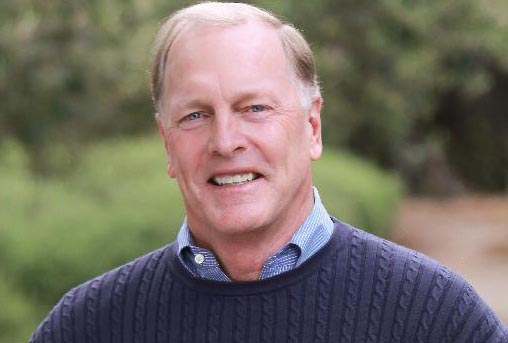US Senate candidate Duf Sundheim visits Paso Robles

Sundheim, 62, grew up, “100 miles east of where Ronald Reagan did,” in La Grange, Ill. Outwardly, Sundheim said that he was a confident success; he was the quarterback in high school, and was later accepted to Stanford University. At home, however, the situation wasn’t quite as easy. He grew up with a disabled brother, who his mother feared would be institutionalized. “Times were different then…” he said. He said that his mother would teach his brother in the basement how to sing and how to speak, hoping that she could alter the fate of her son.
One day, he brought a girl home; “she was even better with my brother than my mom was,” he said. That girl would later become his wife, Cheryl, who now works as an infant mental health specialist.
The way that Sundheim grew up, he says, was very formative on what he believes is important as a candidate. Because of the lack of resources that he saw available to his brother, Sundheim believes in education reform, saying, “Our children are our most valuable resource. Yet, we have a school year designed for an agricultural age, a school day designed for an industrial age and accountability and a curriculum standards unfit for any age. Too many children are trapped in failing schools because of where they live. Parents should have the freedom to choose the best school for their children.”
Sundheim believes Sweden’s educational system could provide a potential model for education reform. He proposes that students be allocated money for school, and then choose where they attend. The American school system has become, “an assembly line,” he says.
The economic issues that California faces begin with education, he says. Common Core is, “a huge issue.” Common Core standards are designed to ready students for college, not necessarily for trades or “real life,” and vocational trade teachers are afraid that, because the standards don’t test the trades, schools will not teach them, as they will be concerned only with meeting standards, he says. Standards, he says, are necessary, but standards need to also be able to recognize individual student differences.
In years past, Sundheim says that there were three paths to the middle class: Manufacturing, small business, and trades. Now, the most popular path is government work, he says. “It’s all about who you know, rather than what you know.” This, he says, is one of the key reasons that minorities and women often have a harder time breaking into the middle class income bracket.
When it comes to education, economics, and other issues that the state faces, such as water, Sundheim really champions one key solution: innovation.
Living in Silicon Valley, Sundheim is surrounded by innovation. The home to companies such as Google, Uber, Dropbox, Instagram, Reddit, Twitter, Yelp, Airbnb and countless others, the Bay Area has become known as the hub of innovative thinking in the state and the nation.
All of Sundheim’s solutions to the state’s key issues seem to have the common thread of innovation; education, leadership, economic issues, equality, and of course, water, could all be addressed through a new lens, now that technology has advanced. During the Age of Enlightenment, where great minds such as John Locke came up with the ideas that democracy is based on, scientific innovation begot philosophy, which begot legislation, he says. This needs to happen again, in this new age of enlightenment and technological advancement, he says.
Sundheim believes that technology will be the solution the California’s water issues. His solution to the issue is multi-tiered. His first change would be to repair the existing infrastructure of the dam systems, which have become outdated and dirty. He also says that recycling water is key. Another solution is desalination plants, but small ones that could be easily updated as technology improves. He recognizes that the key consumer of the state’s water is agriculture, and he is calling for reform and innovation there as well. “We aren’t going to conserve our way out of this,” he says.
Sundheim is not a career politician, but this, he says, makes him stand out from the pack. After graduating from Stanford University with honors and distinction with a degree in economics, he coached football at Stanford and published a book on Bay Area restaurants. He then received a law degree from Northwestern University with the aid of an Exceptional Student Post-Graduate Fellowship. In 2003 he was voted in as the Chairman of the California Republican Party, where he heavily lobbied for the successful recall of Governor Gray Davis.
Sundheim has been working as a mediator for Silicon Valley based mediation company GPS Meditation since 2001. Working as a mediator, he says, would also bring a special and valuable skill set to the senate seat, “Oftentimes both parties are saying the same thing,” he says. He believes that language is a barrier in politics, and that often agreements can be met by simply using different wording.
When asked if he thought that California was ready for a Republican senator, he said, “I didn’t use to think so.” He said that, in the past, he didn’t think that citizens were ready for a new type of leader, and that it didn’t need to be him. But now, he says, he has stepped up because times of changed, and he has been disappointed to see that the way that government operates has not. “Californians need a life raft, and they don’t care if it’s red or blue.”
Below, watch Sundheim announce his candidacy.




















